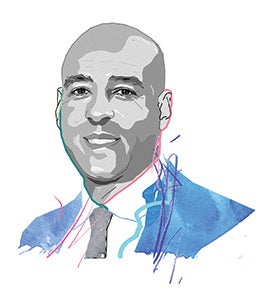All Welcome and Heard
A Note from President Reginald DesRoches

Universities are places of learning, where curiosity and discovery are key to understanding the world and our place in it. They are also places where diverse perspectives and ideas are welcomed and critical thinking is fostered. These characteristics are vital to the development of a vibrant intellectual community that produces well-rounded individuals capable of meaningfully contributing to society.
At Rice, bringing diverse voices to the table is a top priority. Our makeup has changed drastically since opening our doors more than 100 years ago. The university is now home to students, faculty and staff who are a multicultural reflection of the world.
While we have much to celebrate regarding Rice’s rich diversity, I recognize that such efforts are part of a bigger goal where all voices are welcome, civil discourse is maintained and diversity of thought is encouraged.
It is crucial to create an environment where individuals are not afraid to express their views, even if they are unpopular or controversial. This is because universities are where individuals learn to think critically, express their opinions and listen to others who have opposing viewpoints.
This is exactly the type of place I recall from my days as a doctoral student at the University of California, Berkeley. My fellow classmates came from various parts of the world and held a wide range of religious, political and social viewpoints. As we spent hours waiting for our computer codes to run, we debated a range of topics — free from personal attacks and insults — and usually ended up agreeing to disagree, but with a greater appreciation for each other’s viewpoints. These discussions made me realize the important role that culture, society and lived experiences play in shaping our views of the world.
As the American Council on Education has noted, learning within a diverse setting also prepares students to become good and effective citizens in an increasingly complex, pluralistic and often polarized society; fosters mutual respect and teamwork; and helps build communities whose members are judged by the quality of their character and their contributions. Such an environment enhances America’s economic competitiveness by fostering innovation and creativity.
It is crucial to create an environment where individuals are not afraid to express their views, even if they are unpopular or controversial. This is because universities are where individuals learn to think critically, express their opinions and listen to others who have opposing viewpoints.
The goal for Rice is to excel at creating not only a diverse environment but also an inclusive and equitable one. This objective is essential for us to successfully compete for and recruit the world’s most talented and promising students, faculty and staff. This fall, we established a new general education requirement for all incoming undergraduate students. These courses focus on how differences are understood across human societies, how those understandings have changed over time, and the consequences such understandings have on human development, flourishing and knowledge.
As we grow the university, we will remain committed to our residential college system — a system that creates a close-knit environment and a place where differences are celebrated and debates occur over meals, in study halls and late into the evening. Recently, two residential positions in the Office of Multicultural Affairs were created to provide focused support to the residential colleges through enhanced college-based advising and programming on issues related to cultural awareness and inclusivity — with one of the new positions focused particularly on LGBTQ+ life at Rice.
As it concerns socioeconomic diversity, we have increased our efforts to support first-generation college students through various programs on campus that provide financial, academic and social support. The Rice Investment is among the most generous and transparent financial aid programs in the nation and greatly expands support for low- and middle-income families, eliminating tuition and loans for many talented students.
There are several programs at Rice geared toward graduate students as well, a growing population at Rice. One such program is the Graduate and Postdoctoral Studies Pathways Program, which acknowledges the unique challenges faced by graduate students and addresses them through cross-disciplinary, community-based programming.
In addition to our commitment to attract a diverse student body, we’ve also recruited our most diverse group of talented faculty over the past several years — doubling, for instance, the number of Black professors in the past five years and increasing our number of female hires, particularly in fields such as science and engineering where women faculty remain underrepresented.
It is important, too, that the university continues to develop a wider range of institutional partnerships that reflects and strengthens the relationship between diversity and excellence at Rice. Our resolve to be a truly global university and our expanding collaborations with universities around the world, local community colleges, minority-serving institutions, veteran’s organizations and others reflect this commitment.
Diversity, equity and inclusion are foundational values that underscore everything we do and are essential to achieving success in all facets of our mission. I look forward to working with all of you to strengthen our efforts so that the university fully embraces the widest breadth of knowledge, thought, perspectives, experiences and backgrounds.
— Reginald DesRoches
